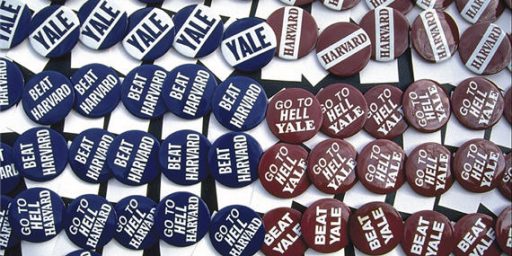Grade Inflation or Smarter Students?
 Harry Brighouse expounds on the novel argument that maybe what we’ve dubbed “grade inflation” is really a legitimate response to increased quality of work from the students rather than a lowering of standards on the part of the professors.
Harry Brighouse expounds on the novel argument that maybe what we’ve dubbed “grade inflation” is really a legitimate response to increased quality of work from the students rather than a lowering of standards on the part of the professors.
Could the students really be more talented? Well, think about the Ivy League schools, which while most of them still practice affirmative action for the children of their alumnae, do it much less than they used to. It is hard to imagine, for example, even a legacy student as weak as now-President George W Bush was at the time gaining admission to Harvard or Yale or any other elite college today, as he did (to Yale, admittedly) in 1964. Nor do most top universities practice affirmative action in favour of men, as they used to (at least, not as much as they used to). In fact, the talent pool from which they can draw has expanded massively, because for a while they admitted women on an equal basis with men, and even now they only put a thumb on the scale for men so that the sex ratios aren’t too severely skewed. The “Gentleman’s C” which both the 2004 Presidential candidates were awarded by Yale in the 1960’s is reputedly a thing of the past, but that is because of the absence of the gentlemen who were awarded them.
Could the students really be better prepared? Here are some possible reasons why they might be. In the past 40 years the mean number of children born into upper middle and upper class families has declined, enabling those families to invest more in each of child; the women who are now eligible for admission have been socialized to be ambitious in academic and career terms over that time. These are also reasons for finding it plausible that students are harder working, at least at elite (top private, and top public) institutions, than they used to be.
It is not even inconceivable that they are better taught, even if it is self-serving for me to say so. The academic job market is much more open and much more competitive than it was 40 years ago, when people routinely got jobs where their friends were without open searches.
I think all that’s likely true for students at top universities, which are more selective even than they were a quarter century ago when I was entering college. On the other hand, having taught at several less prestigious institutions, I can attest to both very low student performance on basic skills such as writing as well as very high pressure from deans and the educational bureaucracy to award grades indicating acceptable performance. A much larger portion of high school students goes to college now than half a century ago. And, Flynn Effect or no, we’re not producing kids who are college material at a rapidly accelerated rate.
There are also practical considerations. Untenured professors are keenly aware that their continued retention is determined, in part, by evaluations by their students. Being an easy grader improves evaluations. Further, giving good grades minimizes the time one has to devote to dealing with students coming to the office whining about their grades — or appealing to department heads and deans, who are going to be annoyed at having to deal with the complaints. That’s especially true at a research institution, where the prime goal is to find time to do productive research.
Brighouse also engages in a longish and interesting consideration of what grades are for, anyway, and argues that those who get got grades aren’t necessarily “meritorious,” merely gifted and lucky enough to be in the right environment. Undoubtedly, there are those who simply skate through based on outstanding natural talent. Most, though, still have to do the work to earn good grades. Or, at least, they would if not for grade inflation.
Photo by Flickr user Eric McFarland under Creative Commons license.






My vote is for a little bit of both.
I think in some ways the expectations for students is lower-I think a lot of teachers do not hold kids accountable for poor work, and I also notice that a lot of teachers seem to structure their grading systems so that even a child who does poorly on some work can still get good grades if they complete some of the easier “give me good grades” assignments.
I do think demands for writing have gone way down. I think other expectations are higher. There seem to be a lot more big projects for my kids than I had in high school and middle school.
But I do think there are a lot of challenging classes and a lot of really bright kids out there. I notice that high schools seem to offer a lot more AP type courses and advanced or honors courses that weren’t available when I attended high school.
I’m not sure about college. At least in my experience, none of the professors had any qualms about flunking someone who dropped the ball in their class (it happened to me on two occasions).
High School, though, has grade inflation galore, although they call it “social promotion.” Meaning, basically, that they are graduating a bunch of students who lack the supposed standard in terms of basic skills and other skills, but they don’t want to hold them back unless it is absolutely necessary so as to not “hurt the kid’s feelings” or some variation thereof.
If Brighouse’s argument has any validity, then we would expect grade inflation to be more pronounced at more prestigious universities.
Interestingly, it is. From an article that’s actually highly critical of the Ivies:
So, food for thought.
I think it’s grade inflation. Look at how American students stack up internationally – it’s telling. Also consider recent studies on the number of students who regularly lie and cheat – a different form of grade inflation. Liberal elitists tend not to understand that the academic bubble will, eventually, burst – and that has economic implications. Overpaid, underqualified people will hold jobs that well-paid, well-qualified people used to. Business will suffer because of it. The leftist illuminati do a disservice on several grounds: flattening educational achievement so that no one is “left out”; taking away incentives for excellence in the business world via bailouts; and overtaxing those who do excel in business.
Interesting topic.
As dangerous as it might be, it is difficult not to view this issue through the prism of one’s own experiences. I was fortunate enough to graduate from some reasonable institutions: a Purdue Engineer in 1981, and subsequently from MIT grad. Later, Chicago business school. No “Ivies,” but not exactly the local community college.
That said, I can tell you unequivocally that from my perspective current admittance standards are tougher today than when I went through school, and the candidate pool is, generally, stronger. Lucky me, grade inflation or no, timing is everything.
Further, as an owner of several dozen businesses the last 18 years, and therefore an ongoing evaluator of potential employee talent, I must say that my observation is that the quality of candidates coming out is actually quite high……………at the top, that is.
Which brings me to my concern and observation: the real answer here (IMHO) is that a tremendous bifurcation of talent and capability is occurring, not dissimilar or divorced from the bifurcation in economic outcomes bemoaned by political observers in recent years.
That is, the economic return to brains, education, talent, risk taking, adaptability and hard work are increasing at an ever accelerating rate. (I know, I know, this is really not a popular view these days. But didn’t Toffler predict this oh-so-long ago? And what do your practical experiences tell you?)
At the top, things have become incredibly competitive, most likely driven by the required increase in international competitiveness that globalization mandates. Smart and driven people applying to and performing at top institutions are naturally reacting. Grades, shmades. These people perform. The market at work, you see.
At the lower end – ah, yes, the lower end – insulated (or simply incapable of reacting) this is where our perception and experience of the laggard, grade inflated, student comes from. Not that grade inflation isn’t real. I bet it is. Probably for many of the reasons James cited.
But if we want to find a policy issue to successfully address – this lower end of the pool – falling ever farther behind, requires inquiry. The smarties and motivated will do just fine. Same as always. The rest………?
And the implications for social policy??????
the real answer here (IMHO) is that a tremendous bifurcation of talent and capability is occurring, not dissimilar or divorced from the bifurcation in economic outcomes bemoaned by political observers in recent years.
I think Drew’s got it. The distribution of ability of American students is radically different than in other countries, and the difference is that the quality of American students falls off dramatically at the bottom of the curve. This is particularly pronounced at the high school level — the top 50% of American high schoolers are competitive with their peers in other first-world countries, but our bottom 50% are, to put it mildly, not — but it also applies at the college level. America’s top college students (not necessarily the same thing as students at America’s top colleges, although there is a great deal of overlap, of course) are doing fine. The rank and file are not.
When combined with another way in which America is an educational outlier — our educational outcomes are more strongly linked to parental wealth than in any other first-world county — I find this worrisome, because it means that other countries are probably using their human resources more effectively. They’re turning their most gifted potential computer programmers into computer programmers, while we’re only using the most gifted potential computer programmers among the body of students whose parents got them into functional schools throughout their pre-college education. If the next Steve Jobs or Bill Gates turns out to be of middle- or upper-class origin, he or she may well be American. If the next Steve Jobs or Bill Gates turns out to be of poor inner-city origin, he or she won’t be.
How about ‘Unionized Teachers, doing some self-justification?’